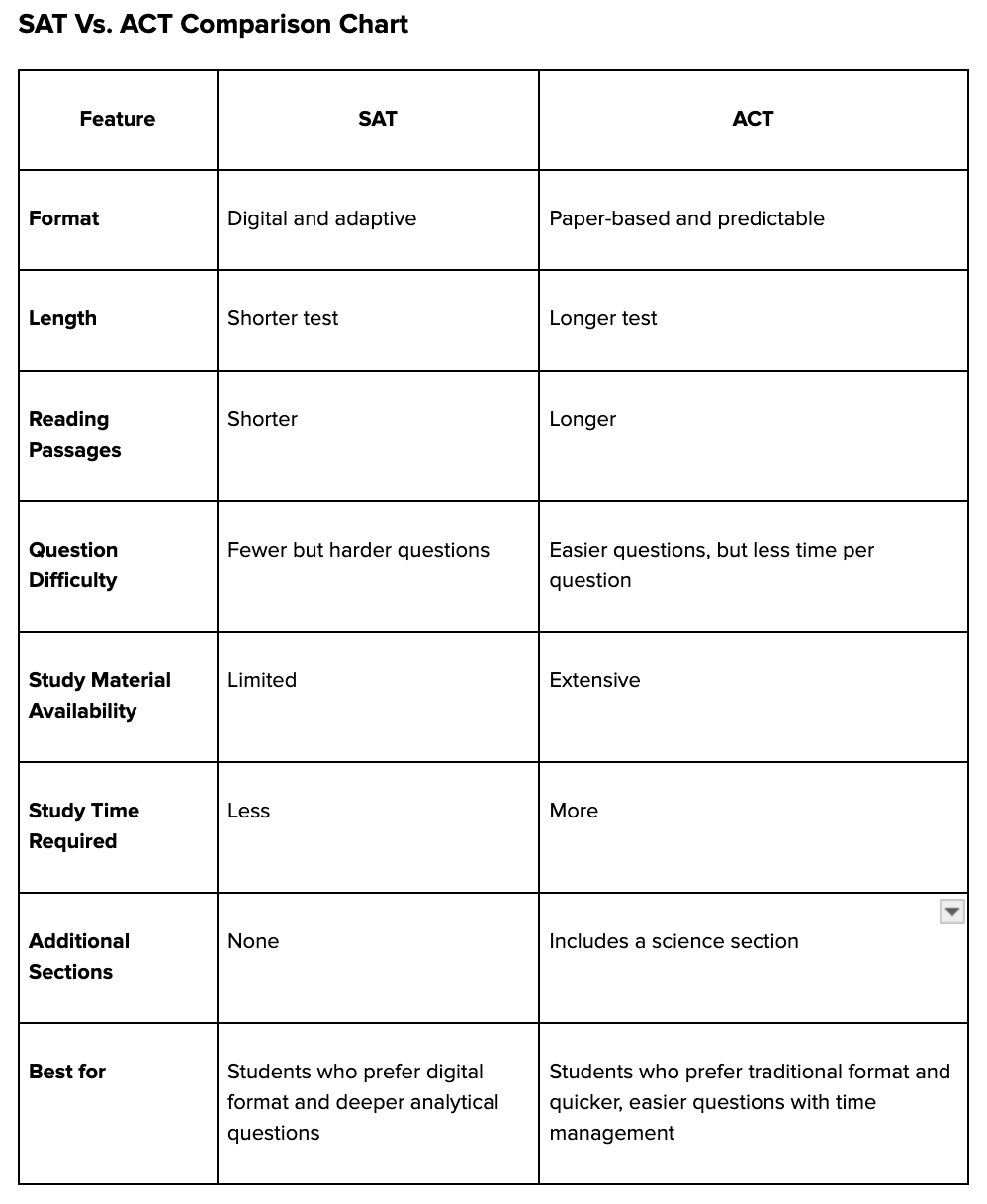SAT and ACT: Differences, Preparation Tips, and Scoring
SATs and ACTs can be real game-changers when it comes to college admissions so many students aim to ace these tests during their college application phase. High scores can help a student stand out and significantly boost their chances of getting accepted.
During the pandemic, many universities temporarily dropped their standardized test requirements. However, schools like Yale, Dartmouth, and Brown have decided to bring back the SAT and ACT requirements for 2024 applicants.
That being said, upcoming college applicants need to understand the nitty-gritty of these tests and consider why and when it's important to take them.
To put it simply, high scores on the SAT or ACT can increase chances for admission and open the door to better financial aid offers, especially from private colleges. Many schools use these scores to determine scholarships, which can significantly reduce the cost of your education. So, not only can a strong score help you get into a top school, but it can also make your education more affordable.
Difference Between SAT and ACT

Photo by cottonbro studio from Pexels
Choosing between the SAT and ACT depends on a student's strengths, preferences, and test-taking strategies. Understanding the differences between the two can help in making an informed decision that aligns with your skills and study habits. Here’s a detailed comparison to guide you:
SAT vs ACT
Format
The SAT is digital and adaptive, meaning the difficulty of the questions can change based on how you’re doing. If you ace the first section, expect tougher questions in the next.
On the flip side, the ACT sticks to a paper-based, predictable format. This consistency can be comforting if you prefer a traditional test-taking experience.
Length and Structure
The SAT is generally shorter, with briefer reading passages, making it ideal for students who like quick, concise reading and problem-solving. Meanwhile, the ACT is longer and includes extended reading passages. This setup is better for those who are comfortable with sustained reading and comprehension over a longer period.
Question Difficulty
The SAT has fewer but tougher questions. This test is designed to dig deeper into your understanding and analytical skills, making each question count more towards your final score. In contrast, the ACT’s questions are easier but require quicker responses, as you have less time per question. This test rewards quick thinking and efficient time management.
The ACT also includes a bonus science section, which tests your ability to interpret data, hypotheses, and experiments rather than specific scientific knowledge.
Study Material
There isn’t as much study material available for the new SAT compared to the ACT, which can make finding comprehensive prep resources a bit challenging. In contrast, the ACT has a wealth of study materials, including numerous prep books, online resources, and practice tests that can help you prepare thoroughly.
Study Time
The SAT generally requires less study time due to its structure. You can focus on mastering specific challenging questions without needing extensive practice across a wide range of topics. On the other hand, preparing for the ACT can take longer since it covers a broader range of subjects and includes the science section. However, the abundance of available study materials can make this process more manageable.
SAT Vs. ACT Comparison Chart

How to Do Well on Standardized Tests
Excelling in the SAT and ACT is more about consistent practice than natural aptitude. Here are some strategies to help boost your scores:
Practice Consistently
Regular practice is key. The more you practice, the more familiar you become with the test format and types of questions. Over time, you'll feel more comfortable and confident with the test structure and your scores will go up!
One-on-One Tutoring
Personalized tutoring can make a big difference. A tutor can provide tailored guidance, focusing on your specific weaknesses and helping you improve. And they will suggest strategies and tips that are customized to your learning style, making your study sessions more effective.
Study Resources
Make use of reputable resources like the College Board, Kaplan, and Princeton Review books. These materials offer practice tests, review sections, and proven test-taking strategies that can help you prepare thoroughly and boost your confidence.
When Not to Take the Tests
SATs and ACTs may seem like a guaranteed higher chance of admission success, but it's important to know when taking these tests makes sense and when it might not—yes, it's still not mandatory at many schools!!
Here are two situations where preparing for the SAT or ACT might not be the best use of your time and resources:
- When you're applying to test-blind schools. If all the schools you are applying to are test-blind, then taking these standardized tests is not necessary. For instance, California state universities (CSUs), university colleges (UCs), and community colleges have adopted a test-blind policy—this means they don't look at standardized test scores at all! If you're only applying to these schools, spending time and money on tests is not valuable.
- When you have below average test scores. The COVID-19 pandemic led to an inflation of test scores with many students only submitting high scores. If your scores are not competitive, submitting them might not benefit your application.
What Is The Best Way To Prepare For SAT?
If there's one thing you should consider when preparing for the SAT and ACT, it's timing. Here’s how you can stay on track:
Start Early
Kick off your prep in the summer after your sophomore year. Starting early gives you plenty of time to get familiar with the test format and figure out your strengths and weaknesses.
Junior Year Testing
Aim to take the tests towards the end of your junior year or early in your senior year. This timing gives you the option to retake the tests a few times if you want to improve your scores.
Book Multiple Test Dates
Schedule several test dates ahead of time. This way, you have the flexibility to retake the test if needed. Spacing the dates a few months apart is a good idea, giving you extra time to prepare between tests.
What Are Good Scores For ACT And SAT?
What counts as a "good" score can vary widely depending on the colleges you’re applying to. Generally, you should aim for the middle 50 percentile range of your target schools.
Doing some research on the average scores of the colleges you’re interested in can help you set realistic and achievable goals. This way, you’ll know exactly what score range you need to be a strong applicant.
Superscoring is another important aspect to consider. It allows you to combine your best section scores from multiple test dates, potentially boosting your overall score. This can be a big advantage, especially if you perform better in different sections on different test dates.
While most schools practice superscoring, it's essential to check each school's policy to be sure. Understanding this can help you plan your test-taking strategy effectively, giving you the best possible chance of getting into your desired college.
Conclusion
Standardized tests like the SAT and ACT are key tools in the college admissions process, especially when you're planning to apply to a school that has reinstated them. A strong score can boost your chances of getting into your dream school and help you secure scholarships—you just need to prepare early and stay consistent with it!
If you need more information or personalized guidance, we’re here to help.
Feel free to reach out to us at contact@mystrivepath.com.
Good luck with your test prep!










